Watch for Divers - The Ultimate Guide to Choosing Yours
A straightforward guide to choosing the perfect dive watch for your underwater adventures.
As someone who's spent time underwater, I can tell you that a reliable watch is more than just a timepiece—it's a key part of every dive. Dive watches aren't just about counting minutes; they're about safety, trust, and having dependable gear strapped to your wrist when exploring the deep blue. Even with all the high-tech gadgets today, these watches remain trusty companions for those who venture beneath the waves. Let's explore how you can pick the perfect dive watch for your next underwater adventure.
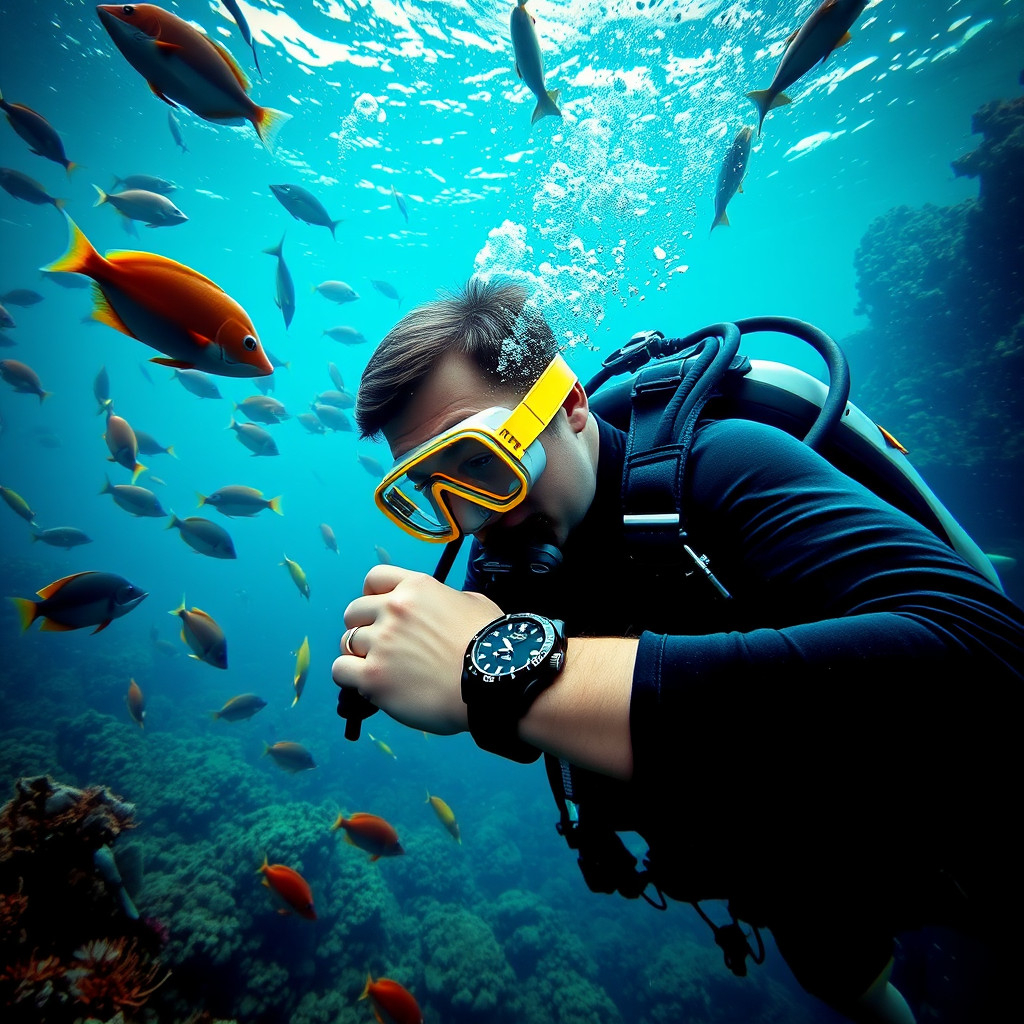
Why You Need a Dive Watch Underwater
When you're deep underwater, keeping track of time is critical. It's not just about scheduling; it's about staying safe. A dive watch helps you monitor your bottom time and plan decompression stops accurately. While many divers use computers nowadays, a good dive watch serves as a trustworthy backup if your electronics fail.
Picture this: you're descending into the ocean, and suddenly, your dive computer stops working. What now? This is where your dive watch comes into play. By manually tracking your time, you can make a safe ascent without risking decompression sickness. It's not just about having a backup—it's about peace of mind.
Dive watches also carry a rich history and have become symbols within the diving community. Wearing one connects you to decades of underwater exploration, from the early days of diving to modern expeditions. It's a nod to tradition and a badge of honor among divers.
The Evolution of Dive Watches
The journey of dive watches began in the early 20th century when waterproofing techniques were first developed. Brands like Rolex and Omega pioneered designs that could withstand the pressures of deep water. As diving became more popular, these watches evolved to include features designed for underwater use.
During World War II, military divers needed reliable equipment, pushing watchmakers to innovate further. The post-war recreational diving boom led to even more advancements. Today, dive watches blend vintage charm with modern technology, offering divers a perfect balance of style and functionality.
Key Features to Look for in a Dive Watch
Picking the right dive watch can feel overwhelming with so many choices out there. Focusing on the main features can help you find a watch that fits your needs without the fuss.
Luminescent Markers
Continuing on visibility, luminescent markers are a must-have. They help you read your watch in low-light conditions or during night dives. Materials like Super-LumiNova or tritium gas tubes provide glow-in-the-dark capabilities, making sure your watch is visible when you need it most.
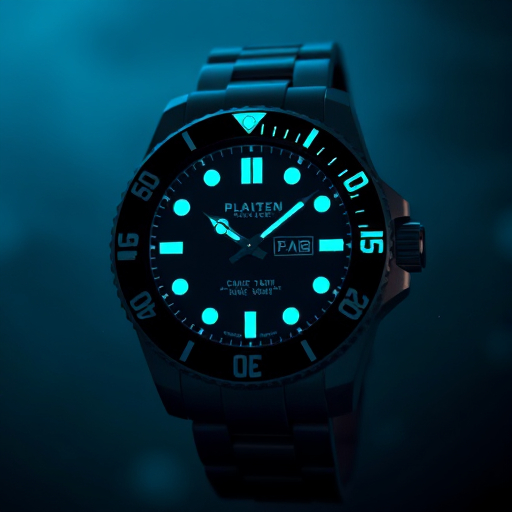
Water Resistance
The most important feature is, of course, water resistance. For recreational diving, a watch rated to at least 200 meters (660 feet) is recommended. This rating means the watch can handle the pressure you’ll encounter during typical dives. If you're planning to go deeper or engage in technical diving, you'll need a watch with an even higher rating.
Keep in mind that water resistance can diminish over time. Seals and gaskets can wear out, so regular maintenance is key to keeping your watch watertight.
Easy-to-Read Dial
Visibility underwater isn't always the best. As you descend, light fades, and it can be tricky to read your watch. That's why a clear, easy-to-read dial with large numbers and markers is important. High-contrast colors and bold hands make it easier to tell the time at a glance.
Unidirectional Rotating Bezel
A unidirectional bezel allows you to track your elapsed dive time. By aligning the bezel's zero marker with the minute hand at the start of your dive, you can easily see how much time has passed. The bezel only turns one way—counterclockwise—so even if it gets knocked, it won't show less time than you've actually been underwater, adding an extra layer of safety.
Durable Construction
Your dive watch needs to withstand harsh conditions. Look for watches made from tough materials like stainless steel or titanium. These metals resist corrosion from saltwater and can handle the bumps and scrapes that come with diving. The crystal covering the watch face should be scratch-resistant, like sapphire crystal, to keep it clear and easy to read.
Comfortable Strap
A good strap is important for comfort and security. Rubber or silicone straps are popular because they flex with your movements and resist water damage. If you prefer a metal bracelet, make sure it's made from corrosion-resistant materials and has a secure clasp.
Movement Type
Dive watches come with different internal mechanisms, known as movements. Mechanical watches, which can be automatic or manual, use a spring-driven mechanism. Automatic watches wind themselves as you move your wrist. Quartz watches are battery-powered and tend to be more accurate and less expensive. Decide what matters more to you—craftsmanship and tradition or precision and affordability.
ISO Certification
Look for watches that meet the ISO 6425 standard for dive watches. This certification means the watch has passed specific tests for water resistance, visibility, magnetic resistance, shock resistance, and more. It's a handy way to make sure you're getting a watch built to rigorous standards.
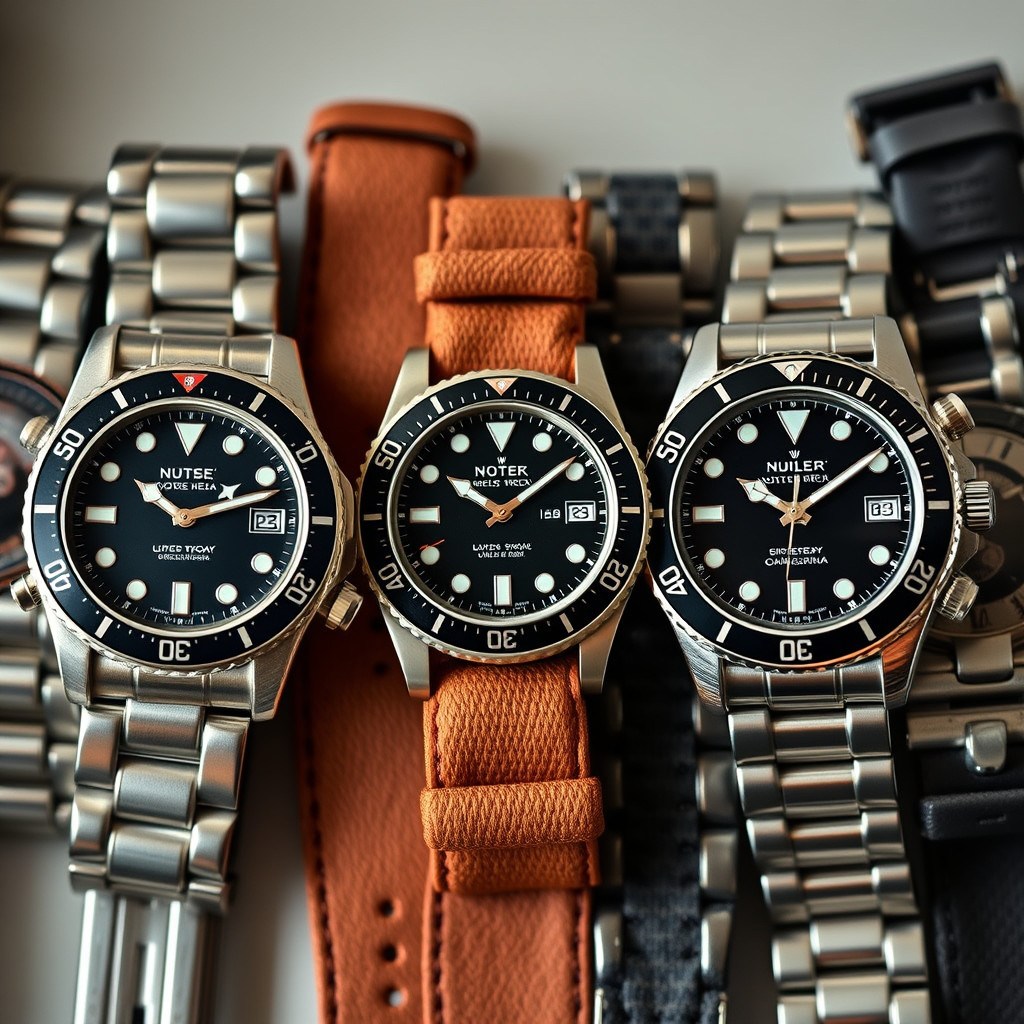
Extra Features to Improve Your Dive
Besides the basics, some extra features can make your diving experience even better.
Depth Gauge
Some dive watches include a depth gauge, allowing you to see how deep you are without relying solely on your dive computer. This can be a useful backup and adds another layer of information during your dive.
Temperature Sensor
A built-in thermometer can let you know the water temperature, which can be helpful for planning your dive or understanding changing conditions underwater.
Alarm Functions
An alarm can serve as a reminder for dive duration or ascent time. It’s a handy feature to have, especially if you prefer audible alerts.
How to Maintain Your Dive Watch
Taking care of your dive watch helps keep it in top condition and makes it last for years.
Rinse After Every Dive
Saltwater and chlorine can damage your watch over time. After each dive, rinse your watch thoroughly with fresh water. This helps remove any residue that could cause corrosion or wear.
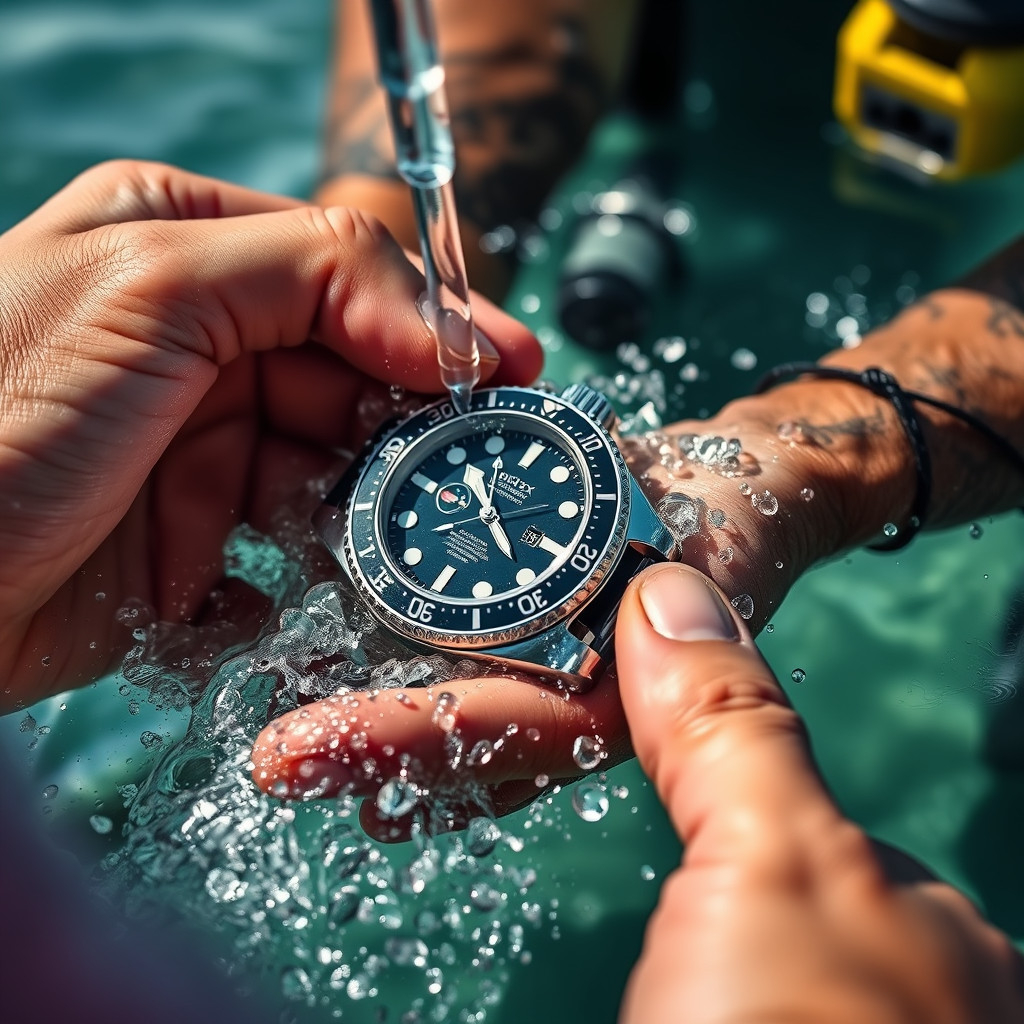
Regular Servicing
Just like a car, your dive watch needs regular check-ups. Having it serviced by a professional keeps seals intact and the movement running smoothly. Regular servicing can prevent small issues from becoming big problems.
Store It Properly
When you're not wearing your watch, store it in a cool, dry place. Keeping it away from extreme temperatures and humidity helps preserve its components.
Check Water Resistance
Water resistance can decrease over time. Have your watch's water resistance tested periodically, especially if it's an older model or has undergone repairs.
Be Mindful of Chemicals
Avoid exposing your watch to harsh chemicals like detergents, solvents, or perfumes. These substances can damage seals and degrade materials, compromising water resistance.
Dive Watches vs. Dive Computers: The Difference
While both are valuable tools, dive watches and dive computers serve different purposes.
Dive Watches
A dive watch is a timekeeping device that helps you track how long you've been underwater. It's reliable, durable, and doesn't rely on batteries (in the case of mechanical watches). It requires you to calculate your dive plan and decompression stops manually.
Dive Computers
Dive computers automatically calculate critical information like depth, bottom time, and no-decompression limits. They adjust in real-time, providing personalized data based on your dive profile.
Using Both Together
Many divers choose to use both a dive watch and a dive computer. The watch acts as a backup if the computer fails. Plus, a dive watch can be worn outside of diving as a stylish accessory.
Making Your Dive Watch Work for You
Choosing the right dive watch is a personal decision. Think about your diving habits and what features are most important to you.
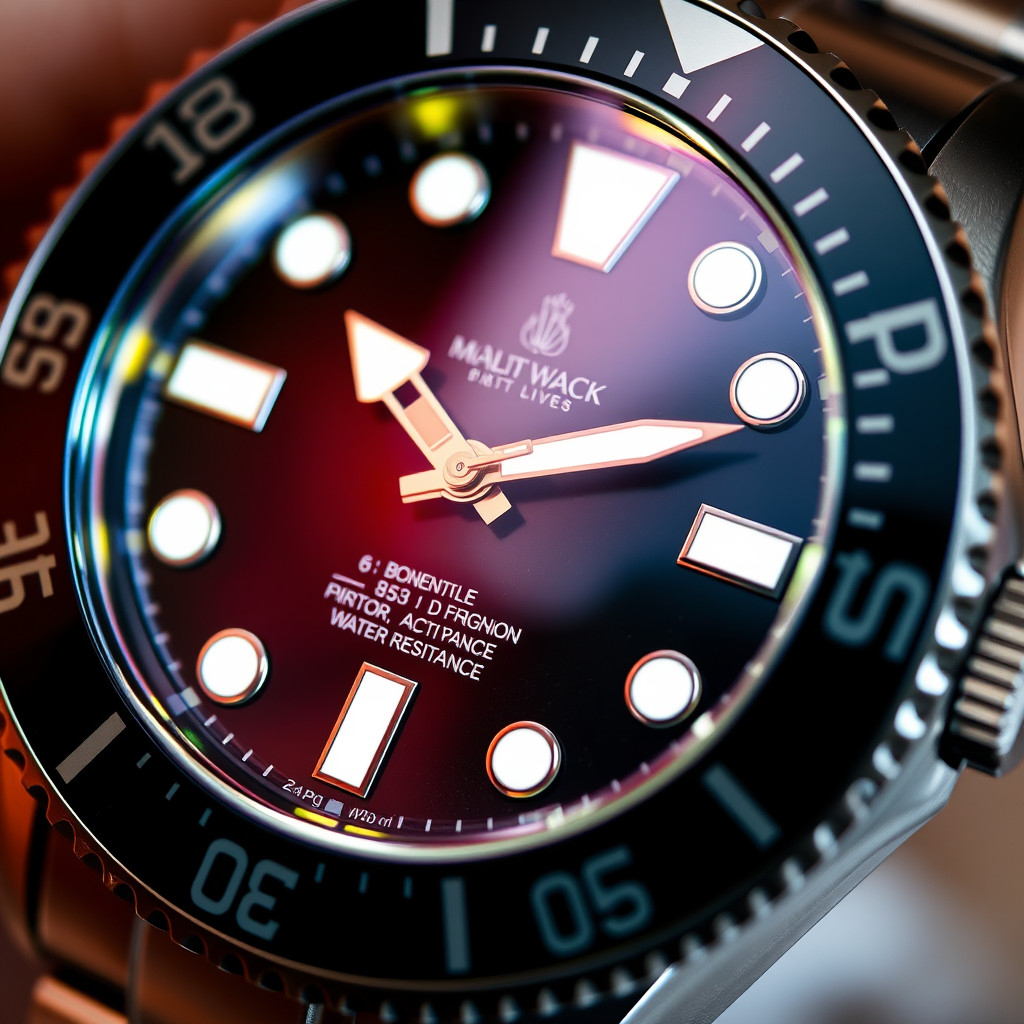
Assess Your Needs
Consider how often you dive and in what conditions. If you're an occasional recreational diver, a basic model with the main features might be sufficient. If you dive frequently or in challenging environments, investing in a higher-end watch could be worthwhile.
Try It On
If possible, try on different watches. Pay attention to how it feels on your wrist. A watch that's too heavy or bulky might become uncomfortable during a dive.
Read Reviews
Look for reviews from other divers. Their experiences can provide insights into the watch's performance and durability in real-world conditions.
Set a Budget
Determine how much you're willing to spend. Remember that a higher price doesn't always mean better for your specific needs.
Consider Warranties
Check if the watch comes with a warranty or service plan. This can provide peace of mind and save you money on repairs down the line.
Appreciating the Dive Watch Tradition
Owning a dive watch is about more than just utility. It's a connection to the rich history of diving and the adventurous spirit that comes with it. Whether you choose a vintage-inspired model or the latest design, your dive watch becomes a part of your diving story.
FAQ
Is a dive watch necessary if I have a dive computer?
While not strictly necessary, a dive watch is a reliable backup. Electronics can fail, and having a mechanical timepiece means you're not left without important information.
How often should I service my dive watch?
It depends on the manufacturer's recommendations and how often you use it. Generally, servicing every one to two years is a good idea.
Can I wear my dive watch daily?
Yes! Dive watches are built to be durable and can handle everyday wear. Plus, they often have a timeless style that suits various occasions.
What's the difference between automatic and quartz movements?
Automatic watches are mechanical and wind themselves as you move. Quartz watches are battery-powered and tend to be more accurate but require battery changes.
What is an ISO-certified dive watch?
An ISO-certified watch meets international standards for dive watches, showing it has passed specific tests for durability and performance underwater.
Do I need a helium escape valve?
Unless you're a professional saturation diver spending extended periods in deep-water environments, you probably don't need this feature.
Can I replace the strap on my dive watch?
Most dive watches allow you to change the strap. You can switch between rubber, silicone, nylon, or metal bracelets based on your preference.

I'm a scuba enthusiast, and marine life lover. I enjoy writing about my diving adventures and sharing my knowledge with others.

I'm a passionate scuba diver and love to share my experiences with you. I enjoy writing about my experiences and sharing my knowledge with others.